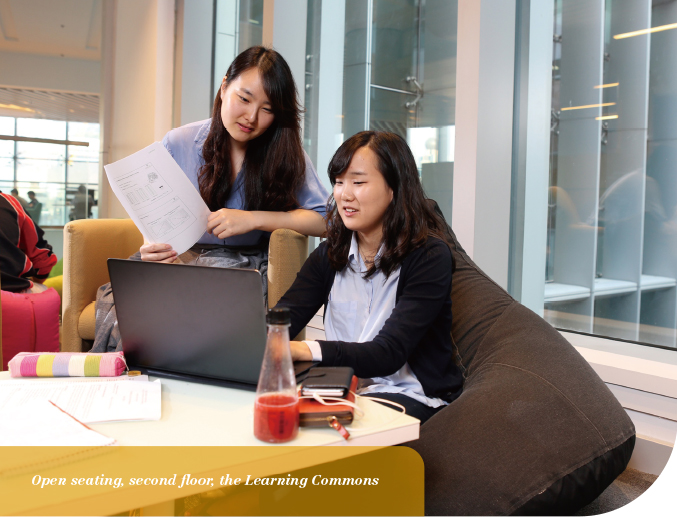

|
|||
"It's more relaxed and comfortable studying here. It's colourful and energetic. I wish we had more places like this on campus."
- Grace Mi Song Kim (pictured left),
Bachelor of Business Administration Year 3 |
"I often use the group study rooms for group projects. It's good that we have more space for group work and self study in between classes."
- Chloe Kim (pictured right), Bachelor of Science Year 3
|
A Unified Campus and Curriculum The new campus achieves one other goal besides supporting the new curriculum – it supports the development of a community of learners and scholars who actively engage with each other in pursuit of the University's educational goals. This is manifested in two ways. First, faculties that previously were scattered in several buildings are being united under one roof. Arts, Social Sciences and Law each now have their own buildings on the new campus. We will apply the same principle in the old campus as we renovate the vacated learning spaces in as similar a style as possible to the new campus and create new 'homes' for various faculties. The first building targeted in this programme is K.K. Leung, which will house the Faculty of Business and Economics. The learning community is also being promoted through student accommodation. Student halls traditionally have done a good job supporting social development and networking among students. Our vision with the new residential colleges is that they also support intellectual development. The new colleges will accommodate postgraduate and senior undergraduate students and they will have three features that support our learning aims. First, students will be asked to participate in local community projects, either service learning or credit-bearing depending on the preference of their faculties. Second, internationalisation and an international outlook will be promoted. Our target is for the colleges to house one third local students, one third Mainland China students and one third international students to promote interaction and better intercultural understanding. This target is unlikely to be achieved in the first year due to teething problems with the new buildings but it will guide residence allocation in 2013. And third, intellectual discourse will be promoted at the colleges by the college masters, who will invite scholars in for talks and organise other academic activities. As mentioned, the opening of the new campus and accommodation in September 2012 encountered a few hiccups due to the tight construction deadlines and the fact we admitted a double cohort in 2012 – the final group of students under the three-year curriculum and the first group under the four-year curriculum. Nonetheless, the most important work has been achieved. After years of effort, we have aligned our curriculum and our campus facilities to meet our academic aspirations. Students at HKU now encounter a total learning experience that provides them with opportunities to challenge themselves and develop into responsible global citizens, who will make an impact on the world and contribute to the betterment of the human condition. |
|||